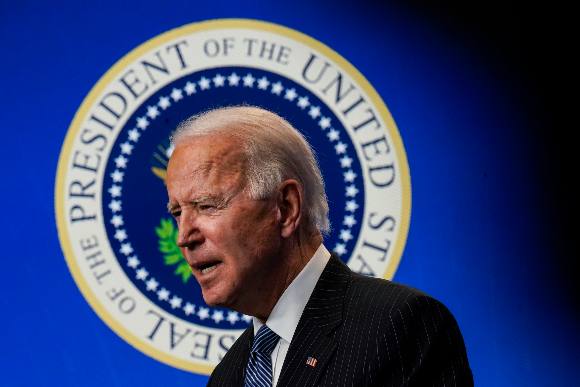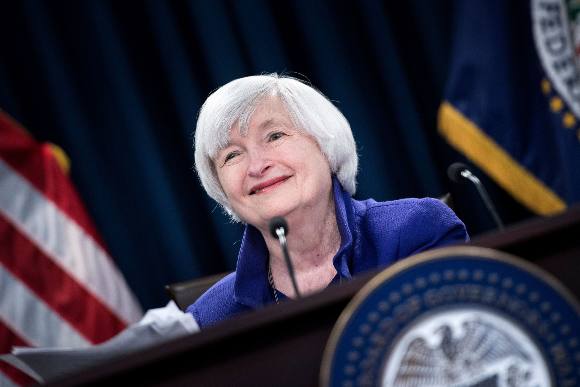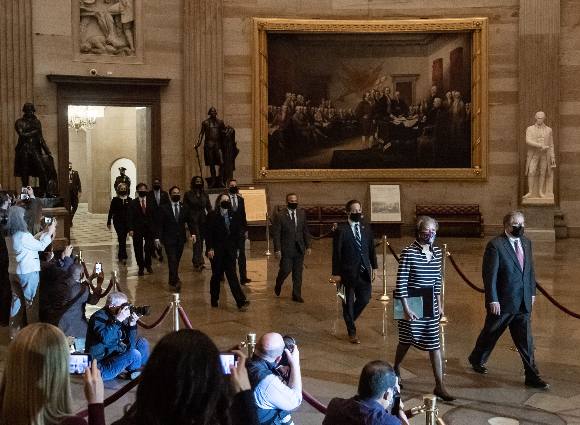The Hill’s Morning Report – Biden argues for legislative patience, urgent action amid crisis

Welcome to The Hill’s Morning Report. It is Tuesday! We get you up to speed on the most important developments in politics and policy, plus trends to watch. Alexis Simendinger and Al Weaver are the co-creators. Readers can find us on Twitter @asimendinger and @alweaver22. Please recommend the Morning Report to friends and let us know what you think. CLICK HERE to subscribe!
Total U.S. coronavirus deaths reported each morning this week: Monday, 419,215; Tuesday, 421,129.
President Biden says there is no time to waste to rescue Americans from a deadly virus and its collateral economic damage. But he speaks like a politician with the patience of Job.
The core of his coronavirus response plan is rapid COVID-19 vaccinations and a Rubik’s Cube legislative proposal that carries a nearly $2 trillion price tag he concedes is tough for many lawmakers to embrace.
In remarks on Monday, Biden repeated that he’s a veteran of some of the thorniest Capitol Hill battles and remains both an optimist and a realist. After less than a week in office, the president said he’s unruffled by doomsday forecasts of an impending legislative comeuppance.
“I’ve always believed part of negotiations on the part of a president or chairman of a committee … is about consultation,” he told reporters in the spacious auditorium of the Eisenhower Executive Office Building adjacent to the White House, with Vice President Harris behind him.
“I don’t expect we’ll know whether we have an agreement and to what extent the entire package will be able to pass or not pass until we get right down to the very end of this process, which will be probably in a couple weeks,” he added.
Note: The last coronavirus package took more than seven months to become law.
Biden says he will take his time to explain to members of the House and Senate why legislation he’s proposed could tackle many urgent problems at once, from pushing out more than 1.5 million doses of COVID-19 vaccine a day month after month, to targeting $1,400 relief checks to Americans who are in dire straits, to getting students and teachers safely back in classrooms and businesses reopened.
“I’m trying to generate some consensus,” he said, adding that he will know when the outreach is over and nose-counting for votes begins. At that point, fallback options come into focus, including potentially carving provisions into legislative pieces, horse-trading to salvage some provisions, or using the time-consuming budget tool known as reconciliation, which requires a majority rather than the 60-vote threshold in the Senate.
“I think we are far from that point right now,” Biden said.
The Hill: Republicans have panned Biden’s $1.9 trillion blueprint, with some senators suggesting they might draft alternatives. Democrats who are willing to give Biden time to search for consensus are nervously watching the legislative calendar.
Gerald F. Seib, The Wall Street Journal: The center emerges as an early testing ground for Biden.
What takes place around the country with the coronavirus (as well as with Republican politics) over the next few weeks will shape what is attainable in Congress by spring and early summer. Biden repeated scientists’ heartbreaking prediction that another 250,000 Americans may die of COVID-19 before the United States turns a corner toward mass immunity.
In the last week, states and localities administered an average of 1.25 million doses of vaccine per day but managed to administer only 57 percent of the shots delivered to them, according to the Bloomberg News vaccine tracker.
Two large states, California and New York, have been hit hard by waves of COVID-19 surges, each time followed by new rounds of restrictions. On Monday, governors in both states announced they will ease some of those restrictions because caseloads improved following Christmas holiday outbreaks.
California Gov. Gavin Newsom (D) lifted statewide stay-at-home orders to allow restaurants to open for outdoor dining options and salons to resume indoor appointments. Outdoor church services are also permitted. The state will now revert to a county tier system, which eases lockdowns depending on case rates and gives local officials the option to set their own restrictions (The Hill and The Associated Press). … In New York, Gov. Andrew Cuomo (D) said on Monday he will ease some COVID-19 restrictions but not indoor dining in New York City. He said the state on Wednesday will announce how it will reopen economic activity in existing micro-cluster zones (ABC7NY).

On the vaccine front on Monday, Anthony Fauci, the leading U.S. expert on infectious diseases, said he is concerned about delaying administration of second doses of coronavirus vaccines, which is a choice made in some areas of the United Kingdom. “I would be concerned about that because you don’t get full efficacy until you get that second dose,” the director of the National Institute of Allergy and Infectious Diseases told the virtual Davos World Economic Forum conference. “It may not be the case, but it gets risky,” he added.
Pointing to different coronavirus strains in the U.K. (detected in 22 states), Brazil (detected in Minnesota) and South Africa (not yet identified in the United States), Fauci said available vaccines appear to be effective against them but that “we need to be prepared to upgrade” (Financial Times).
That’s exactly what vaccine manufacturer Moderna is doing as it develops a booster inoculation aimed at the coronavirus variant identified in South Africa. Both the Moderna and Pfizer vaccines appear to be less effective against that coronavirus strain (Reuters and The New York Times).
> Biden Cabinet: The Senate voted 84 to 15 on Monday to confirm Janet Yellen as Treasury secretary, the first woman to hold the position. Senate Minority Leader Mitch McConnell (R-Ky.) supported her nomination, and she cleared the Senate Finance Committee by unanimous vote. All 15 no votes were from Republicans, including a handful who may be eyeing a 2024 presidential bid, including Sens. Tom Cotton (Ark.), Ted Cruz (Texas), Josh Hawley (Mo.), Rand Paul (Ky.) and Rick Scott (Fla.). The former chair of the Federal Reserve joins Defense Secretary Lloyd Austin and Director of National Intelligence Avril Haines as the three confirmed Cabinet members as of this morning (The Hill and The Washington Post).

LEADING THE DAY
POLITICS: Sen. Rob Portman (R-Ohio) sent shockwaves across the political sphere on Monday by announcing that he will not run for reelection in 2022, a major surprise that creates a competitive seat in the looming midterm elections.
Portman, 65, a two-term Ohio Republican and top McConnell ally, pointed to the white-hot polarization of politics and the increasing lack of appetite for lawmakers to cross the aisle and strike deals (The Hill).
“We live in an increasingly polarized country where members of both parties are being pushed further to the right and further to the left, and that means too few people who are actively looking to find common ground,” Portman said in a statement. “This is not a new phenomenon, of course, but a problem that has gotten worse over the past few decades.”
As recently as December, Portman indicated that he was running for reelection. In 2016, Portman defeated former Ohio Gov. Ted Strickland (D) by 17 points, leading most political prognosticators to consider the incumbent Republican a heavy favorite. According to a GOP source, Portman informed McConnell of his decision on Monday morning, marking a major blow for centrist Republicans and bipartisan work.
“What it means is that it’s harder to be Rob Portman in today’s world where it’s all about scoring points and compromising is a weakness,” one GOP operative told the Morning Report. “If you want to go on Fox News and be an asshole, it’s easier than ever. If you want to be thoughtful, work hard, compromise and get shit done, it’s harder than it’s ever been.”
Looking ahead, almost anyone who’s anyone in Ohio GOP politics is signaling interest in a potential bid for the seat (The Hill). According to the operative, Rep. Jim Jordan (Ohio) is the prohibitive favorite if he decides to jump in the race.
“There are two worlds. There’s a world where Jordan runs and he’s the probative favorite, and there’s another where it’s wide open,” the strategist said, adding that former Ohio Treasurer Josh Mandel would be the favorite if Jordan passes. “He’s run and won statewide before. The base loves him. He has $3.5 million in the bank. Half of the county chairs would endorse him on day one.”
Among the others who are expected to consider a bid are Lt. Gov. Jon Husted (R), state Attorney General Dave Yost, author J.D. Vance, Reps. Steve Stivers (Ohio) and David Joyce (Ohio), and former Rep. Pat Tiberi (Ohio).
As GOP strategists note, most anyone who runs will be giving up something substantial. Statewide office holders such as Husted, Yost and Ohio Secretary of State Frank LaRose, another possible candidate, would not be able to use any statewide funds for a federal contest. House members can use monies raised for previous contests (for example, Jordan has $5 million in cash on hand and Stivers has $1.3 million) but would have to give up mostly safe seats to launch a bid.
Tiberi, who represented a central Ohio seat for 17 years before retiring in 2018, runs the Ohio Business Roundtable and would have to take a significant pay cut. He has $5 million in the bank.
“Nobody who is running can run from cover,” said Mark Weaver, an Ohio-based GOP strategist who previously served as a top Portman consultant.
Across the aisle, Rep. Tim Ryan (D-Ohio) headlines the list of potential party nominees. Ryan, an 18-year veteran of Congress with an eye for the limelight, tweeted that he is “looking seriously” at a bid (The Hill).
Politico: Portman’s exit signals uncertainty for Senate GOP.
Alexander Bolton, The Hill: Portman’s exit underscores Republican identity crisis.
Reid Wilson, The Hill: On The Trail: Little GOP interest in post-election introspection.

> State GOP brouhahas: Long-simmering tensions within state Republican parties are spilling into plain sight, as conservative activists loyal to former President Trump look to cement their hold on the GOP.
As The Hill’s Max Greenwood writes, with Trump now settling into his post-presidency, the grassroots activists whom Trump has inspired are ratcheting up pressure on Republicans they deem too moderate or insufficiently loyal to the former president and his political legacy. Nowhere is that more evident than Arizona, where the state GOP narrowly reelected Kelli Ward, a polarizing figure who was among Trump’s biggest boosters in the state, as chairwoman.
The Arizona GOP also passed three resolutions censuring three of Arizona’s most prominent Republicans, including Gov. Doug Ducey, former Sen. Jeff Flake and Cindy McCain, who endorsed President Joe Biden ahead of the November election.
Niall Stanage: The Memo: Now or never for GOP on Trump.
The Hill: GOP digs in on preserving Trump tax cuts.
The Hill: Republicans plan voting overhauls after Biden’s win.
READ an excerpt from Jonathan Allen (NBC News) and Amie Parnes’s (The Hill) new book, “Lucky: How Joe Biden Barely Won the Presidency.” The authors describe the turning point in Biden’s campaign when he secured the endorsement of House Majority Whip Rep. James Clyburn (D-S.C.), who helped shift support among Black voters to the former vice president during the primary.
****
MORE ADMINISTRATION: On Wednesday, Biden will take action on climate change and energy policy by directing federal agencies to determine how expansive to make a ban on new oil and gas leasing on federal lands. The president also will direct the government to conserve 30 percent of all federal land and water by 2030, create a task force to assemble a government-wide action plan for reducing greenhouse gas emissions, and issue a memorandum elevating climate change to a national security priority. Biden will also create several new commissions and positions within the government focused on environmental justice and environmentally friendly job creation, including one to help displaced coal communities (The New York Times).
Note: The previous administration did not revive coal jobs, despite pledges to bolster U.S. coal producing states. Average quarterly coal mining employment fell 23.6 percent from the first quarter of 2017, when Trump took office, through the third quarter of 2020. Coal production fell 31.5 percent between the first quarter of 2017 and the 2020 election (S&P Global Market analysis).
The Washington Post: One coal-state senator, Democrat Joe Manchin of West Virginia, holds the key to the most ambitious climate agenda ever proposed by an American president.
> U.S. Surgeon General: Biden as soon as today is expected to name Susan Orsega, a nurse, to the position previously held during the Trump administration by Jerome Adams, an anesthesiologist and former vice admiral in the Public Health Administration. Orsega is a career-commissioned officer in the U.S. Public Health Service corps and a longtime infectious-disease specialist (The Washington Post).
> As expected, Biden on Monday signed an executive order to reverse Trump’s ban on transgender troops serving openly in the U.S. military. The president had campaigned to lift his predecessor’s decision on “day one.” Biden’s action “immediately prohibits involuntary separations, discharges, and denials of reenlistment or continuation of service on the basis of gender identity or under circumstances relating to gender identity,” the White House said (NBC News).
The president on Monday also signed an executive order aimed at closing loopholes in existing “Buy American” provisions, which apply to about a third of the $600 billion in goods and services the federal government buys each year, Reuters reported. The order will make any waivers more transparent and create a senior White House role in the Office of Management and Budget to oversee the process.
“I don’t buy for one second that the vitality of American manufacturing is a thing of the past,” Biden said. “American manufacturing was the arsenal of democracy in World War II and it must be part of the engine of American prosperity now.” Biden reiterated plans announced during his campaign to replace the fleet of federal cars with U.S.-made electric vehicles.
In Canada, Biden’s Buy American order received some pushback on Monday from Finance Minister Chrystia Freeland, who said free trade is on the agenda for discussion between the two governments (Reuters).
> Biden told reporters on Monday that the United States is concerned about Russia’s treatment of Alexey Navalny, a prominent Kremlin critic who was poisoned, treated while in a coma in Germany and returned to Moscow after his recovery and is now jailed by the Russian government. Biden said he asked advisers for a full rundown on Russia’s activities related to Navalny and other pro-democracy and anti-corruption protests; Russia’s alleged breach of U.S. government computer systems; and reported Russian bounties paid for the deaths of U.S. troops in Afghanistan. Meanwhile, the new Biden team is working with Russia to reach a New START nuclear weapons agreement (Reuters, The Associated Press and The Hill).
> The regulatory profile of the Biden administration’s Consumer Financial Protection Bureau will swing sharply to the left if the Senate confirms Rohit Chopra to lead the agency. Chopra, one of the first officials to serve in the bureau after its creation following the financial crisis, has a view of the U.S. financial sector consistent with that of Sen. Elizabeth Warren (D-Mass.). The idea for the bureau originated with Warren before she decided to run for a seat in the Senate (The Hill).
IN FOCUS/SHARP TAKES
CONGRESS & IMPEACHMENT: On Monday night, McConnell signaled he would back off his requirement that a shield for the filibuster be written into a power-sharing agreement with Senate Democrats, which has been held up since Jan. 20. The Senate’s Democratic leadership remains firm against putting a defense of the filibuster in writing, although two Democratic senators — Manchin and Sen. Kyrsten Sinema (D-Ariz.) — say they support preserving the 60-vote threshold. In exchange for handing over the gavels of the powerful committees, McConnell originally said he wanted Democrats to promise to preserve the filibuster (NBC News and The Hill). Senate Majority Leader Charles Schumer (D-N.Y.), during an interview with MSNBC’s Rachel Maddow taped before McConnell’s comments, repeated his unwillingness to negotiate with the Republican leader to deliver such a commitment (The Hill).
The Washington Post: McConnell relents on Senate rules, signals power-sharing deal with Democrats.
> House managers delivered the article of impeachment against Trump to the Senate on Monday, officially putting the 45th president on trial for his incitement of the riot on the U.S. Capitol almost three weeks ago.
The ceremonial delivering of the article (seen below) by the nine House Democrats who will handle the case took place 12 days after the House impeached Trump, making him the only president in history to be impeached by the lower chamber twice (The Hill).

When the public trial kicks off in the Senate on Feb. 8, Chief Justice John Roberts will not return to Capitol Hill to preside as he did last year. Instead, Sen. Patrick Leahy (D-Vt.), the Senate president pro tempore, will do the honors, with senators presiding when the defendant is not a sitting president.
Leahy on Monday confirmed he would wield the gavel and promised to administer “impartial justice.”
“The president pro tempore has historically presided over Senate impeachment trials of non-presidents. When presiding over an impeachment trial, the president pro tempore takes an additional special oath to do impartial justice according to the Constitution and its laws. It is an oath that I take extraordinarily seriously,” the Vermont Democrat said in a statement, vowing that he will “not waver from my constitutional and sworn obligations to administer the trial with fairness, in accordance with the Constitution and the laws.”
A Leahy spokesman said the decision on who presides is up to Schumer and McConnell.
CNN: Biden: Trump’s impeachment trial “has to happen.”
The Leahy news comes as Trump and his allies are in the midst of a pressure campaign to minimize the GOP defections in the looming trial. Among the threats being lobbed are the creation of a third party or a primary challenge for anyone who votes to convict, according to The Hill’s Jonathan Easley.
The immediate goal of the campaign is to ensure Republicans don’t get the 17 votes needed to convict the ex-president, but there are longer-term issues at play, as a third party could irreparably harm the GOP, which needs Trump’s supporters to remain viable. However, McConnell and his allies remain concerned that corporate donations could dwindle following the Jan. 6 attack on the Capitol, putting Republicans in a bind.
Politico: Twitter bans MyPillow CEO.
The Morning Report is created by journalists Alexis Simendinger and Al Weaver. We want to hear from you! Email: asimendinger@digital-staging.thehill.com and aweaver@digital-staging.thehill.com. We invite you to share The Hill’s reporting and newsletters, and encourage others to SUBSCRIBE!
OPINION
The Biden administration’s Saudi problem, by David Ignatius, columnist, The Washington Post. https://wapo.st/3qSduyA
Something special just happened in Russia, by Alexey Kovalev, opinion contributor, The New York Times. https://nyti.ms/3c9XMLa
WHERE AND WHEN
The House meets at 9 a.m. on Thursday.
The Senate convenes at 10 a.m. to take up the nomination of Antony Blinken to be secretary of State. The Senate Commerce, Science and Transportation Committee will hold a confirmation hearing at 10 a.m. for Gina Raimondo, governor of Rhode Island, to be Commerce secretary. If the Senate confirms the governor, Lt. Gov. Dan McKee (D) succeeds her (WPRI).
The president and vice president will receive the President’s Daily Brief in the Oval Office at 9:45 a.m. Biden will outline a racial equity agenda and sign executive actions in the State Dining Room at 2 p.m., with Harris in attendance. … Separately, Harris will ceremonially swear in Yellen at noon. At 4 p.m., the vice president and her husband, Doug Emhoff, will receive their second COVID-19 vaccine doses at the National Institutes of Health in Maryland.
The White House press briefing is scheduled at 12:30 p.m. It will include the first public appearance during the new administration of White House domestic policy adviser Susan Rice, a former national security adviser and former U.S. ambassador to the United Nations under former President Obama.
INVITATIONS: The Hill Virtually Live hosts events as the new administration gets underway:
TODAY at 1 p.m.: “Modern Credit Systems, Alternative Data & the American Dream.” Headlining a conversation about modernizing the credit system are Suze Orman, John Hope Bryant, and Reps. Joyce Beatty (D-Ohio) and Patrick McHenry (R-N.C.). RSVP HERE.
TODAY at 3:30 p.m.: “Listening to America.” What are the concerns of citizens in communities small and large, rural and urban? Colorado Gov. Jared Polis (D), New Orleans Mayor LaToya Cantrell (D) and voices from diverse communities discuss. RSVP HERE.
Wednesday at 11:30 a.m.: “Relief to Recovery: What’s Next for Small Business?” The discussion features Sen. Ben Cardin (D-Md.), a member of the Senate Small Business and Entrepreneurship Committee, and Rep. Blaine Luetkemeyer (R-Mo.), with the House Financial Services Committee and Subcommittee on Consumer Protection and Financial Institution. Register HERE.
Also on Wednesday, Fauci joins The Hill’s “Challenge of Our Time: The COVID-19 Vaccine” at 1:15 p.m. to discuss vaccine manufacturing. A second expert panel at 2:30 p.m. will discuss distribution. The first panel in addition to Fauci features Francis Collins, director, National Institutes of Health; Mikael Dolsten, chief scientific officer and president, Worldwide Research, Development and Medical, Pfizer; Rep. Eddie Bernice Johnson (D-Texas), chairwoman, House Committee on Science, Space and Technology; Soumya Swaminathan, chief scientist, World Health Organization; and Leana Wen, emergency physician and visiting professor, George Washington University Milken Institute School of Public Health.
Here’s the second panel on Wednesday: Susan Bailey, president, American Medical Association; John Banovetz, chief technology officer, 3M; Mayor Sharon Weston Broome (D), Baton Rouge, La.; John Brownstein, chief innovation officer, Boston Children’s Hospital; Sree Chaguturu, chief medical officer, CVS; Daniel Dawes, director, Satcher Health Leadership Institute; Peter Hotez, co-director, Center for Vaccine Development, Texas Children’s Hospital; Margaret Moss, associate professor in nursing, University of British Columbia; Jay Timmons, president and CEO, National Association of Manufacturers; Wes Wheeler, president, UPS Healthcare; and Rep. Brad Wenstrup (R-Ohio), member, House Ways and Means Committee. Register HERE.
Hill.TV’s “Rising” program features news and interviews at http://digital-staging.thehill.com/hilltv or on YouTube at 10:30 a.m. EST at Rising on YouTube.
ELSEWHERE
➔ AVIATION: Delta Air Lines plans to bring back 400 pilots to work by the summer after sidelining some of the workforce during the pandemic. Delta declined to comment or provide a forecast for future schedules or capacity (Reuters).
➔ INTERNATIONAL: Italian Prime Minister Giuseppe Conte resigned this morning to form a new government with the hope that President Sergio Mattarella will allow him to create one with new backing from portions of parliament. Conte’s resignation comes after centrist members, led by former Prime Minister Matteo Renzi, broke off from the coalition due to the government’s response to COVID-19 (Reuters).
➔ SUPREME COURT: Justices on Monday dismissed two lawsuits that alleged Trump violated the Emoluments Clause of the Constitution by profiting off of his properties in New York and Washington. The court’s action erases a pair of rulings in New York and Virginia that previously went against Trump and allowed plaintiffs to bring cases against the former president (The New York Times). … The Supreme Court handed a victory to advocates of abortion rights on Monday, wiping off the books lower court rulings that had upheld a Texas order banning nearly all abortions in the state during the coronavirus pandemic (NBC News).
➔ CURRENCY: The Biden administration is restarting a drive to put Harriet Tubman on the $20 bill. The effort was launched in 2016 by then-Treasury Secretary Jack Lew, with Tubman potentially replacing former President Andrew Jackson. However, it was put on ice during the Trump administration after the ex-president said in 2016 that the pending move resulted from “pure political correctness.” In 2019, former Treasury Secretary Steven Mnuchin announced the redesign of the $20 bill would be delayed and that redesigns of the $10 and $50 bills would take priority for security purposes. “It is important that our … money reflect the history and diversity of our country, and Harriet Tubman’s image gracing the new $20 note would certainly reflect that,” White House press secretary Jen Psaki said on Monday. “We are exploring ways to speed up that effort” (The Associated Press).
THE CLOSER
And finally … The Bidens’ beloved dogs, Major and Champ, a pair of German shepherds, began to make the White House a home on Monday (ABC News). The welcome mat rolled out on the South Lawn with help from veteran White House horticulturist and groundskeeper Dale Haney (pictured), who has helped care for presidential pets for decades.

Copyright 2024 Nexstar Media Inc. All rights reserved. This material may not be published, broadcast, rewritten, or redistributed..













